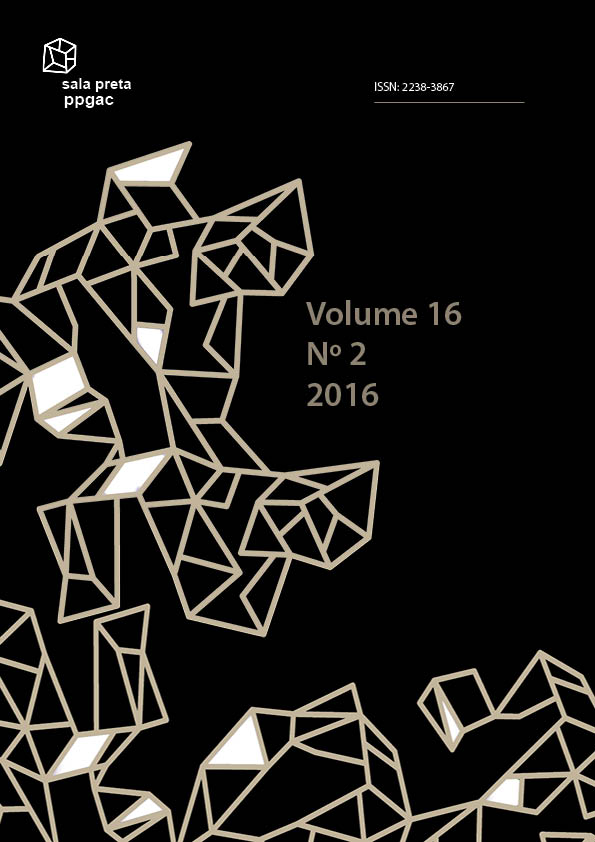Contemporary didascalic games: means to open poetic spaces of choric stage and circumscribe a place for speech
DOI:
https://doi.org/10.11606/issn.2238-3867.v16i2p233-256Keywords:
Didascalia, Immanent poetics, Choric stage, Poststructural authorship.Abstract
This article discusses didascalia in contemporary dramatic writing as a way to construct and expose the stage as a poetic space in which the spoken word assumes (and again exposes) its place as the mediating element between imagination and the stage concreteness. I take as a starting point my understanding that the didascalic information rises in the interior of the theatrical code the question of how to fundament the theatrical writing, whether textual or scenic. I then show how contemporary didascalia has a theatricalizing function and thus establishes a relational and not a substantial fundament for the stage event and the languages it engages, for the link between the spoken word and the actors’ bodies as well as for the configuration of the communicative axis between stage and spectators. By suggesting this relational poetics to the eye of the spectator, it emphasizes the choric structure of the contemporary stage.
Downloads
References
ALVIM, Roberto. Dramáticas do Transumano e outros escritos seguidos de Pinokio. Rio de Janeiro: 7Letras, 2012.
BIRKENHAUER, Theresia. “Entre fala e língua, drama e texto: reflexões acerca de uma discussão contemporânea.” Trad. de Stephan Baumgartel. Urdimento, No.18, 2012. p. 181-188.
CORNAGO, Oscar. “Que es la teatralidade?” Telondefondo, No.1, 2005. p.1-13.
DERRIDA, Jacques. Margens da Filosofia. Trad. de Joaquim Torres Costa & Antônio Magalhães. Campinas: Papyrus, 1991.
---. A escrita e a diferença. São Paulo: Perspectiva, 1999.
DIDI-HUBERMANN, Georges. Cuando las imagenes toman posición. Madrid: Machado Libros, 2008.
FISH, Stanley. Is there a text in this class? The authority of interpretative communities. Cambridge & London: Harvard University Pres, 1980.
FOUCAULT, Michel. “O que é um autor?” in: FOUCAULT, Michel. Ditos & Escritos III, org. Manoel Barros da Motta. Rio de Janeiro: Universitária Forense, 2009, p.264-298. [Original francês de 1969].
MÉGEVAND, Martin. “L’éternel retour du choeur” Littérature, N°131, 2003. Masques, intertextes. pp. 105-122.
MÜLLER_SCHÖLL, Nikolaus. “(Un-)Glauben. Das Spiel mit der Illusion.” In SCHOENMAKER, Henri et. al. Theater und Medien/Theatre and the Media. Grundlagen – Analysen – Perspektiven. Eine Bestandsaufnahme. 2008, p. 445-456.
NICOLETE, Adélia. Luis Alberto de Abreu: Um Teatro de Pesquisa. São Paulo: Perspectiva, 2011.
PASSÔ, Grace. Por Elise. Manuscrito em word do texto teatral (2005). Arquivo pessoal do autor. Publicado também pela Editora Cobogó, 2012.
RAMOS, Luis Fernando. O parto de Godot e outras encenações imaginárias. A rubrica como poética da cena. São Paulo: Hucitec, 1999.
SARRAZAC, Jean-Pierre (org.). Léxico do Drama Moderno E Contemporâneo. São Paulo: Cosac& Naify, 2012.
TRIAU, Christophe. “Coralidades Difratadas”. Tradução de Marcos Vinicius Borja. Manuscrito não-publicado, arquivo do autor. Originalmente publicado em Alternatives Théâtrales, no. 76-77, 2003.
Downloads
Published
Issue
Section
License
Ao submeter um artigo à Sala Preta e tê-lo aprovado para publicação os autores concordam com os termos da Licença Creative Commons Atribuição-NãoComercial-CompartilhaIgual 4.0 Internacional. Os autores mantém, sem restrições, os direitos autorais dos documentos publicados pelo periódico.
Os documentos distribuídos sob os termos da Licença Creative Commons Atribuição-NãoComercial-CompartilhaIgual 4.0 Internacional podem ser compartilhados, copiados e redistribuídos em qualquer meio e formato desde que sem fins comerciais e que os devidos créditos sejam dados. Os documentos também podem ser adaptados, remixados e transformados desde que, neste caso, as contribuições feitas ao material original sejam distribuídas sob a mesma licença que o original.





